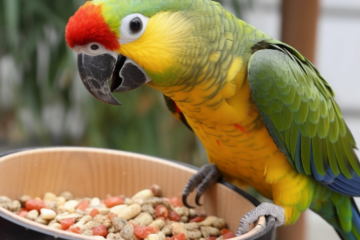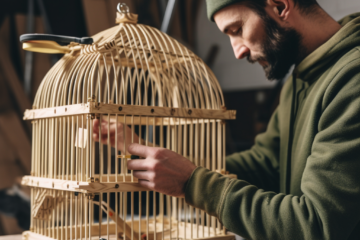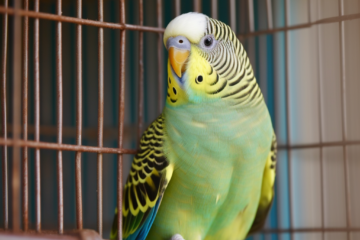-
-
What are the key factors to consider when setting up a cockatiel’s habitat?
-
How can I ensure my cockatiel’s diet is nutritionally balanced?
-
What are some essential hygiene practices to keep my cockatiel healthy?
-
How can I best bond with my cockatiel and train it effectively?
-
What common health issues should I watch out for in my pet cockatiel?
-
Did you know that cockatiels can live up to 20 years when well cared for? These charming birds make delightful companions but require dedicated care to thrive. From providing a balanced diet and a spacious cage to offering mental stimulation and regular veterinary check-ups, there’s much to consider when caring for a cockatiel.
Ensuring your feathered friend’s health and happiness involves creating a safe environment, establishing routines, and building trust through positive interactions. In this guide, we will explore essential tips and practices to help you become a knowledgeable and attentive cockatiel owner. Stay tuned for valuable insights on nurturing your pet bird’s wellbeing.
Setting Up Your Cockatiel’s Habitat
Cage Placement
When setting up your cockatiel’s habitat, place the cage in a quiet area away from drafts to ensure their comfort and well-being. This helps reduce stress and promotes healthy habits.
Perches Variety
Provide perches of varying sizes and textures within the cages for your cockatiel to exercise their feet muscles. This variety feeding helps prevent foot issues and keeps them active.
Toys for Stimulation
Including toys, feeding, habitats, and accessories in the cages is essential for your cockatiel’s mental stimulation and entertainment. Rotate different toys regularly to keep them engaged and prevent boredom.
Choosing the Right Cage and Accessories
Spacious Cage
When selecting cages or habitats for your cockatiel, opt for one with horizontal bars to facilitate climbing and exploration. The bird should have ample space to move around comfortably. A roomy cage allows the bird to spread its wings and exercise freely.
Ensure that the cage provides enough space for perches, toys, feeders, and other essential accessories. Cockatiels are active birds that need mental stimulation through play with toys. By offering a diverse range of toys and perches, you can keep your pet entertained and engaged.
Secure Locks
Choose a cage with secure locks to prevent any accidental escapes. Cockatiels are curious birds, small pets that may attempt to open doors or explore outside their enclosure. To ensure their safety, invest in a cage with reliable locking mechanisms that cannot be easily manipulated by the bird.
To further enhance security measures, place the cage in an area free from potential hazards such as open windows or doors. Cockatiels are known for their inquisitive nature and may try to venture out if given the opportunity.
Easy-to-Clean Dishes
Include food and water dishes that are easy to clean and refill regularly. Proper grooming and care are crucial for maintaining your cockatiel’s health and well-being. Dirty dishes can harbor bacteria and lead to health issues for your feathered friend.
Opt for stainless steel or ceramic dishes that can be easily washed with mild soap and water. Avoid using plastic dishes as they can harbor bacteria more easily due to scratches on the surface.
List of Recommendations:
-
Choose a spacious cage with horizontal bars.
-
Opt for secure locks on the cage doors.
-
Provide easy-to-clean food and water dishes.
-
Include a variety of perches, toys, feeders in the cage.
-
Ensure proper spacing between bars to prevent escape attempts.
Optimizing Cockatiel Environment and Lighting
Temperature Control
Maintaining a comfortable temperature range between 65-80°F is crucial for your bird’s health and care. Sudden fluctuations can stress them out.
Cockatiels, as pet parents, are sensitive to extreme temperatures and habitats, so it’s essential to provide a consistent care and comfortable environment for them to thrive in. Ensure that the room they are kept in stays within the recommended temperature range to prevent any health issues.
Lighting Requirements
Full-spectrum lighting or natural sunlight is vital for cockatiels as it helps in synthesizing vitamin D, which is essential for their overall well-being. Position their cage where they can get some exposure to natural light during the day.
Adequate lighting also plays a significant role in regulating your cockatiel’s sleep patterns and behavior. Make sure they have access to light during the day and experience darkness at night to mimic their natural habitat conditions.
Day-Night Cycle
Establishing a consistent day-night cycle is beneficial for your pet bird’s mental and physical health. This routine helps regulate their internal clock, promoting better sleep patterns, wellness, and overall well-being.
Creating a schedule where your cockatiel experiences daylight hours followed by periods of darkness will help them feel secure and comfortable in their environment. Consistency in this cycle will reduce stress levels and ensure a happy, healthy bird.
Cockatiel Diet and Nutrition Essentials
Balanced Diet
Offer a balanced diet to your cockatiels, including pellets, fresh vegetables, fruits, and seeds. This variety ensures they receive essential nutrients for optimal health.
Maintain a good balance between the different food types to cater to their diverse nutritional needs.
Fresh Water Supply
Provide clean, fresh water daily in a spill-proof container for your cockatiel. Hydration is crucial for their well-being, wellness, and overall health.
Regularly check the water level and cleanliness of the container to ensure your bird has access to clean water at all times.
Foods to Avoid
Avoid feeding your cockatiel certain foods like avocado, chocolate, caffeine, and high-fat items. These can be harmful or toxic to them.
Educate yourself on other foods that are dangerous for cockatiels, bird, fish, so you can keep them safe from potential harm, feed.
Maintaining Cockatiel Hygiene Practices
Cage Cleaning
Regularly clean your cockatiel’s cage to prevent the buildup of dirt, droppings, and bacteria. A dirty cage can lead to health issues for your pet bird. Use a mild soap and water solution to scrub the cage bars, perches, and toys. Rinse everything thoroughly and allow it to dry completely before placing your cockatiel back inside.
Nail and Wing Trimming
Trimming your bird’s nails is essential for pet parents to prevent overgrowth that can cause discomfort or difficulty in perching. Trimming their wings helps prevent accidental escapes or injuries from flying into objects. If you are unsure how to trim their nails or wings safely, consult a veterinarian or an experienced bird groomer for guidance.
Bathing Techniques
Bathing is crucial for maintaining your cockatiel’s hygiene. You can bathe them by misting them with lukewarm water using a spray bottle or by providing a shallow dish of water for them to splash around in. Some cockatiels enjoy bathing more than others, so observe your bird’s preferences and adjust accordingly.
Remember that each cockatiel has unique needs.
Bonding and Training Your Cockatiel
Socializing Daily
Spend quality time socializing with your cockatiel daily to build a strong bond. Interact with your bird by talking, singing, or offering treats, creating a positive association.
Cockatiels are social creatures that thrive on attention and companionship. Regular interaction helps prevent loneliness and behavioral issues in these intelligent birds.
Positive Reinforcement Techniques
When training your cockatiel, remember to use positive reinforcement techniques. Reward good behavior with treats or praise to reinforce desired actions.
Avoid using punishment-based methods as they can lead to fear and mistrust in your pet bird. Instead, focus on rewarding desired behaviors consistently for effective training results.
Teaching Simple Commands
To strengthen the bond with your cockatiel, consider teaching them simple commands like step-up or recall. Use treats as incentives to encourage learning and cooperation from your feathered friend.
Identifying Common Health Issues
Signs to Watch For
Watch for signs of respiratory distress, such as wheezing or labored breathing, which may indicate underlying health issues. Keep an eye out for feather plucking, a behavior that can signal stress or health problems in cockatiels.
Monitoring Droppings
Monitor your cockatiel’s droppings regularly to detect any changes in color, consistency, or frequency. Any unusual variations in food could indicate digestive issues or other health concerns that require attention.
Seeking Veterinary Help
If you notice any abnormal behavior or symptoms in your cockatiel, bird, or animal, it is crucial to consult an avian veterinarian promptly. Professional guidance is essential in addressing health issues and ensuring the wellness of your feathered companion.
Preventive Care and Veterinary Visits
Regular Check-ups
Pet parents should schedule regular check-ups with an avian veterinarian for their cockatiels. These visits are crucial to ensuring the bird’s overall health and well-being. By visiting the vet at least once a year, potential health issues can be identified early on.
It is essential for pet parents to maintain a consistent schedule for these check-ups, as they allow the veterinarian to monitor the bird’s health status closely. During these visits, discuss preventive measures such as vaccinations and parasite control with your avian vet. These measures play a vital role in safeguarding your cockatiel against common illnesses.
Health Records
Keeping detailed records of your cockatiel’s health history is imperative for effective preventive care. Pet parents should maintain a journal documenting any changes in behavior, eating habits, or physical appearance. This information can help veterinarians diagnose potential issues accurately.
Ensuring Cockatiel Safety at Home
Removing Hazards
Ensure the safety of pet birds by removing toxic plants, household chemicals, and small objects from their reach. This prevents accidental ingestion or injuries.
Cockatiels are curious birds that may explore their surroundings. Therefore, it’s crucial to eliminate any potential dangers within the home environment. Toxic plants such as lilies and philodendrons can be harmful if ingested by these small birds.
Using Pet-Safe Products
Opt for pet-safe cleaning products to maintain a healthy living space for your bird, dog, fish, and food. Harsh chemicals found in regular cleaners can pose a threat to your bird’s well-being.
When cleaning areas frequented by your pet bird, always choose products specifically designed to be safe for animals. This simple switch can prevent accidental poisoning and ensure a safer environment for your beloved cockatiel.
Supervising Interactions
It’s essential to supervise interactions between your cockatiel, dog, fish, and other pets in the household. While some cats, dogs, or small pets may coexist peacefully with birds or fish, accidents can still happen if not closely monitored.
Always keep an eye on any interactions between your cockatiel, small pet, and fish to prevent potential harm or stress. By being vigilant and proactive, you can create a harmonious environment where all pets feel secure.
Final Remarks
You’ve now equipped yourself with the essential knowledge to provide top-notch care for your cockatiel. By setting up a comfortable habitat, ensuring proper nutrition, hygiene, and safety measures, bonding with your feathered friend, and being vigilant about potential health issues, you’re on the right track to fostering a happy and healthy relationship with your pet. Remember, consistency is key in maintaining your cockatiel’s well-being.
Take the time to implement these practices consistently and observe how your cockatiel responds. Your efforts will not only ensure a fulfilling life for your pet but also strengthen the bond between you. Stay proactive in caring for your cockatiel, and you’ll both reap the benefits of a joyful companionship. Keep up the great work!
Frequently Asked Questions
What are the key factors to consider when setting up habitats for pet birds like female cockatiels?
When setting up your cockatiel’s habitat, ensure it has adequate space for flying and perching, provide toys for mental stimulation, offer a variety of perches for foot health, and place food and water dishes in easily accessible locations.
How can I ensure my cockatiel’s diet is nutritionally balanced?
To maintain a balanced diet for your cockatiel, include high-quality pellets as the main staple, supplement with fresh vegetables and fruits daily, offer occasional seeds or nuts as treats in moderation, and always provide access to clean water.
What are some essential hygiene practices to keep my cockatiel healthy?
Maintain your cockatiel’s hygiene by regularly cleaning its cage and accessories, providing regular baths or showers to help with preening and feather health, trimming nails if needed to prevent overgrowth, and monitoring overall cleanliness of its environment.
How can I best bond with my cockatiel and train it effectively?
Bond with your cockatiel by spending quality time together daily through gentle interactions like talking or singing softly. Use positive reinforcement techniques for training such as offering treats for desired behaviors. Be patient, consistent, and understanding during the bonding process.
What common health issues should I watch out for in my pet cockatiel?
Keep an eye out for common health issues in cockatiels such as respiratory infections, feather plucking behavior indicating stress or illness, abnormal droppings which may signal digestive problems or parasites. Any signs of lethargy or changes in appetite should prompt a vet visit.


